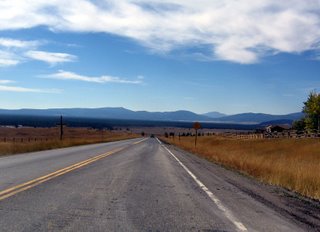Friday, October 06, 2006
Alone on the road in Big Sky Country

September 29:
We’re driving through central Montana now, en route to Yellowstone. The phrase “purple mountains’ majesty” keeps running through my head. I assume these are the Rockies in front of me right now as we head south on Highway 191. They’re beautiful—and mysterious.
“I like looking at mountain ranges that are unfamiliar,” Val said. So do I. It’s reassuring that the world is still this rugged and immense in some places; that I have not known all the mountains there are to know.
This is definitely wilder country than I’m used to. About half the big rigs that roar past are equipped with steel bars over their headlights and grilles: protection against the damage a wayward elk or deer can do at 60 mph.
But while it’s rural and austere out here, the people in this area have incorporated modern amenities. Farmers use electronic tags and GPS to monitor cattle. Grain silos are mouse-eared with satellite dishes.
I know it’s not written in stone anywhere that people in rural America have to live in primitive conditions, but still the presence of some of this technology is strange to me. This place with its vast prairies, bare hills and distant, snowy mountains reminds me as much of the frontier as just about anywhere I’ve been, and yet I can find wireless internet in just about any roadside motel.
While you can definitely get the amenities when you stop for the night, the trek can still be daunting. There are no streetlights along I-90 in Montana, only the taillights of the semis and the awareness of the unfettered landscape slumbering in the blackness. For this reason, I think the state focuses on communicating more frequently with the motorist. The green signs indicating the distance to the next few towns come more often than they do in California. Where you mark your progress to Redding or Los Angeles in 11-mile increments on I-5, in Montana these signs give you updates every three miles.
“No, you can’t see anything in any direction, no you don’t recognize the names of such places as Tarkio (indie music dorks may recognize the name from Colin Meloy's pre-Decemberists band) or Alberton, but you’re not lost. You’re making progress.”
Also, to combat the encroaching remoteness, everything here is world famous. Roadside bars, general stores, restaurants—put your mind at ease, lonesome traveler. YOU ARE CLOSE TO SOMETHING SOMEONE OUTSIDE OF THE STATE HAS HEARD OF BEFORE.
I love the views out here, but I can’t get in sync with the music. We ate at an Arby’s in Butte last night (no three pepper hot sauce here, dammit) and had to listen to a steaming heap of contemporary country.
“Cadillac Tears”? I tried to appreciate the dark humor in a revenge story involving perpetually buying Cadillacs with the alimony from a divorce, but what the song is trying to cast as poetic-justice female empowerment just comes off as a self-perpetuating cycle of victimhood.
Hey man, she’s cruisin’ down the street with custom wheels and leather seats
You know, she gets a new one every year
Aw, she’s crying big Cadillac tears
How many years does this woman have to dwell on the failed marriage and the man who hurt her? Isn't this celebrating the self-perpetuation of a culture of victimhood?
We talked about modern country music last night on the way from Butte to Bozeman. The myth of authenticity pervades most forms of popular music, but it’s especially potent in country, where current artists and songwriters continue to peddle a hoary false dichotomy: country versus city; dirty pickup versus BMW; poor versus rich; simple versus sophisticated; authentic versus phony.
Nashville is a big city filled with talented songwriters and musicians. It’s a pillar of country music. The people recording this music aren’t playing out on the back porch with pawn shop-bought Stella guitars. They’re playing brand-new Fenders and Gibsons in state-of-the-art studios with professional musicians. It’s sophisticated, and that’s OK. Slickness has long been a part of country (Nashville didn't just spring up in the 1980s as a songwriting and recording mecca). We don’t have to write artless lyrics and dial up the twang to compensate for the fact that we make slick music. Lyrics can be more artful than “she thinks my tractor’s sexy.”
I can’t stand the saccharine sentimentality in some songs; the disregard of cadence in others (when I hear Gretchen Wilson sing “keepin’ it counTRY,” I want her to drown in a mudhole).
But I’m moving to New York, so what’s the point of opining about this? I won’t be a ranch hand or truck driver anytime soon.
Still, it bothers me how these artists often sing about leering caricatures of their listeners—and how the listeners eat it up and cheer for more.
